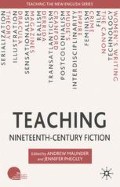Abstract
Before the advent of postcolonial literary criticism, which is usually dated from Edward Said’s Orientalism (1978), most studies of nineteenth-century British fiction had little to say about the colonies or the Empire.1 That was largely because, from Jane Austen through George Gissing, most novelists focused on domestic settings and characters. Austen wrote during and shortly after the Napoleonic Wars, which ended with the Battle of Waterloo in 1815. Nevertheless, though soldiers and sailors appear in her novels, they are ordinarily minor characters, and while some of them have served, like Colonel Brandon in Sense and Sensibility (1811), in India or elsewhere, none of the scenes in her novels takes place abroad. So, too, in New Grub Street (1891) and The Odd Women (1893), Gissing has very little to say about places and events beyond Britain, and that is true as well of Thomas Hardy’s Wessex novels and of most of Elizabeth Gaskell’s and George Eliot’s fiction.
Access this chapter
Tax calculation will be finalised at checkout
Purchases are for personal use only
Preview
Unable to display preview. Download preview PDF.
Works cited
Anderson, Warwick, The Cultivation of Whiteness: Science, Health, and Racial Destiny in Australia (Melbourne: Melbourne University Press, 2002).
Azim, Firdous, The Colonial Rise of the Novel (New York: Routledge, 1993).
Bayly, Christopher A., Atlas of the British Empire: The Rise and Fall of the Greatest Empire the World Has Ever Known (New York: Facts on File, 1989).
Brantlinger, Patrick, Victorian Literature and Postcolonial Studies (Edinburgh: Edinburgh University Press, 2009).
Brontë, Charlotte, Jane Eyre, 1847 (London: Penguin, 1996).
Conrad, Joseph, Heart of Darkness, 1899 (New York: W. W. Norton, 2006).
David, Deirdre, Rule Britannia: Women, Empire, and Victorian Writing (Ithaca: Cornell University Press, 1995).
Gissing, George, The Whirlpool (Hassocks: Harvester Press, 1977).
Nord, Deborah, Gypsies and the British Imagination, 1807–1930 (New York: Columbia University Press, 2006).
Perera, Suvendrini, Reaches of Empire: The English Novel from Edgeworth to Dickens (New York: Columbia University Press, 1991).
Said, Edward, Culture and Imperialism (New York: Knopf, 1993).
Spivak, Gayatri Chakravorty, “Three women’s texts and a critique of imperialism,” “Race,” Writing, and Difference, Henry Louis Gates, Jr. (ed.) (Chicago: The University of Chicago Press, 1986), pp. 262–80.
Yonge, Charlotte, The Daisy Chain: or, Aspirations, 1856 (London: Macmillan, 1876).
Editor information
Editors and Affiliations
Copyright information
© 2010 Patrick Brantlinger
About this chapter
Cite this chapter
Brantlinger, P. (2010). Empire. In: Maunder, A., Phegley, J. (eds) Teaching Nineteenth-Century Fiction. Teaching the New English. Palgrave Macmillan, London. https://doi.org/10.1057/9780230281264_4
Download citation
DOI: https://doi.org/10.1057/9780230281264_4
Publisher Name: Palgrave Macmillan, London
Print ISBN: 978-0-230-53781-1
Online ISBN: 978-0-230-28126-4
eBook Packages: Palgrave Literature CollectionLiterature, Cultural and Media Studies (R0)

